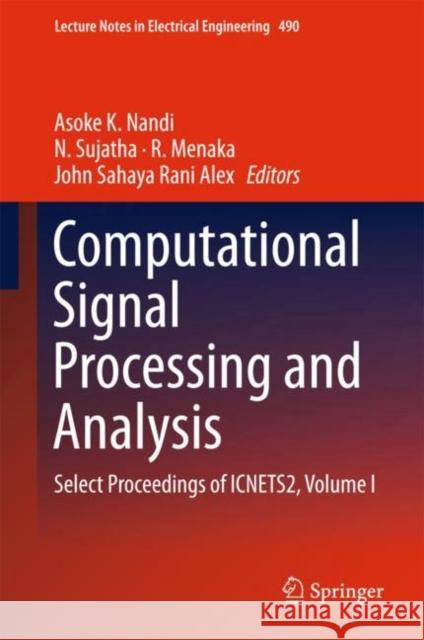Computational Signal Processing and Analysis: Select Proceedings of Icnets2, Volume I » książka



Computational Signal Processing and Analysis: Select Proceedings of Icnets2, Volume I
ISBN-13: 9789811083532 / Angielski / Twarda / 2018 / 416 str.
Computational Signal Processing and Analysis: Select Proceedings of Icnets2, Volume I
ISBN-13: 9789811083532 / Angielski / Twarda / 2018 / 416 str.
(netto: 768,56 VAT: 5%)
Najniższa cena z 30 dni: 771,08
ok. 22 dni roboczych
Bez gwarancji dostawy przed świętami
Darmowa dostawa!
Featuring the latest research on computational signal processing and analysis, the book is useful to researchers, professionals, and students working in the core areas of electronics and their applications, especially signal processing, embedded systems, and networking.
Detecting Happiness in Human Face using Minimal Feature Vectors.- Analysis of Myocardial Ischemia from Cardiac Magnetic Resonance Images using Adaptive Fuzzy Based Multiphase Level Set.- Diagnosis of Schizophrenia Disorder using Wasserstein Based Active Contour and Texture Features.- Anticipatory Postural Adjustments for Balance Control of Ball and Beam System.- A New Extended Differential Box-Counting Method by Adopting Unequal Partitioning of Grid for Estimation of Fractal Dimension of Gray Scale Images.- Computing Shortest Path for Transportation Logistics from High Resolution Satellite Imagery.- Combined Analysis of Image Processing Transforms with Location Averaging Technique for Facial and Ear Recognition System.- Robust Detection and Tracking of Objects using BTC and Cam-Shift Algorithm.- Effect of Dynamic Mode Decomposition Based Dimension Reduction Technique on Hyperspectral Image Classification.- Performance Evaluation of Lossy Image Compression Techniques Based on the Image Profile.- A Novel Video Analytics Framework for Microscopic Tracking of Microbes.- Application of Dynamic Thermogram for Diagnosis of Hypertension.- A Comparative Study of Isolated Word Recognizer using SVM and Wavenet.- Feature Ranking of Spatial Domain Features for Efficient Characterization of Stroke Lesions.- Evaluation of Cepstral Features of Speech for Person Identification System Under Noisy Environment.- Segmentation of Cochlear Nerve Based on Particle Swarm Optimization Method.- Evaluating the induced Emotions on Physiological Response.- Accuracy Enhancement of Action Recognition using Parallel Processing.- A Segmentation Approach using Level Set Coding for Region Detection in Mri Images.- Off-Line Odia Handwritten Character Recognition: A Hybrid Approach.- A Method for Detection and Classification of Diabetes Non-Invasively.- Sound Based Control System used in Home Automation.- An Empirical Mode Decomposition Based Method for Feature Extraction and Classification of Sleepapnea.- Kapur’s Entropy and Active Contour Based Segmentation and Analysis of Retinal Optic Disc.- Segmentation of Tumor from Brain Mri using Fuzzy Entropy and Distance Regularised Level Set.- Effect of Denoising on Vectorized Convolutional Neural Network for Hyperspectral Image Classification.- Classification of Fnirs Signals for Decoding Right and Left Arm Movement Execution using SVM for BCI Applications.- Estimation of Texture Variation in Malaria Diagnosis.- Fusion of Panchromatic Image with Low-Resolution Multispectral Images using Dynamic Mode Decomposition.- Enhanced Scalar invariant Feature Transformation.- Selection of a Hall Sensor for usage in A Wire Rope Tester.- Transliteration of Braille Code into Text in English Language.- Semi-Blind Hyperspectral Unmixing using Non Negative Matrix Factorization.- Comparision of Butterworth and Chebyshev Prototype of Band-Pass Filter for MRI Reciever Front End.- Object Tracking Based on Position Vectors and Pattern Matching.
Professor Asoke K. Nandi received his Ph.D. degree from the University of Cambridge (Trinity College). He has held positions at the University of Oxford, Imperial College London, the University of Strathclyde, and the University of Liverpool. In 2013, he moved to Brunel University London as the Head of Electronic and Computer Engineering. In 1983, his co-discovery of the three particles (W+, W− and Z0) was recognized by the Nobel Committee for Physics in 1984. He has made numerous fundamental contributions to signal processing and machine learning and has authored over 550 technical publications, with an h-index of 67. He is a fellow of the Royal Academy of Engineering, UK and of seven other institutions including the IEEE. Among the many awards he has received are the IEEE Heinrich Hertz Award (2012), the Glory of Bengal Award for his outstanding achievements in scientific research (2010), the Institution of Mechanical Engineers Water Arbitration Prize (1999), and the Mountbatten Premium from the Institution of Electrical Engineers (1998).
Dr. N. Sujatha graduated in Biomedical Optics from NTU (Nanyang Technological University) Singapore and is an associate professor at the Department of Applied Mechanics, IIT Madras, India. She has also served as a visiting associate professor at NTU Singapore in 2014–2015. Her major research interests are laser-based diagnostic imaging and diagnostic optical spectroscopy. She has co-authored a book chapter and published over 50 international journal/conference papers, several of which have won best paper awards. She is a member of International Society for Optical Engineering, Optical Society of America, and is a fellow of the Optical Society of India.
Dr. R. Menaka received her doctoral degree in Medical Image Processing from Anna University, Chennai and is currently an associate professor at the School of Electronics Engineering at VIT, Chennai. She has served in both industry and academia for more than 25 years and has published over 35 research papers in various national and international journals & conferences. Her areas of interest include signal and image processing, neural networks and fuzzy logic.
John Sahaya Rani Alex is an associate professor at the School of Electronics Engineering at VIT, Chennai. She has worked in the embedded systems and software engineering fields for 12 years, which includes 7 years’ experience in the USA. Her research interests include spoken utterance detection and implementations of digital signal processing (DSP) algorithms in an embedded system. She is a member of IEEE and the IEEE Signal Processing Society.
This book comprises a collection of papers by international experts, presented at the International Conference on NextGen Electronic Technologies (ICNETS2-2017). ICNETS2 encompassed six symposia covering all aspects of electronics and communications engineering domains, including relevant nano/micro materials and devices. Featuring the latest research on computational signal processing and analysis, the book is useful to researchers, professionals, and students working in the core areas of electronics and their applications, especially signal processing, embedded systems, and networking.
1997-2025 DolnySlask.com Agencja Internetowa
KrainaKsiazek.PL - Księgarnia Internetowa









